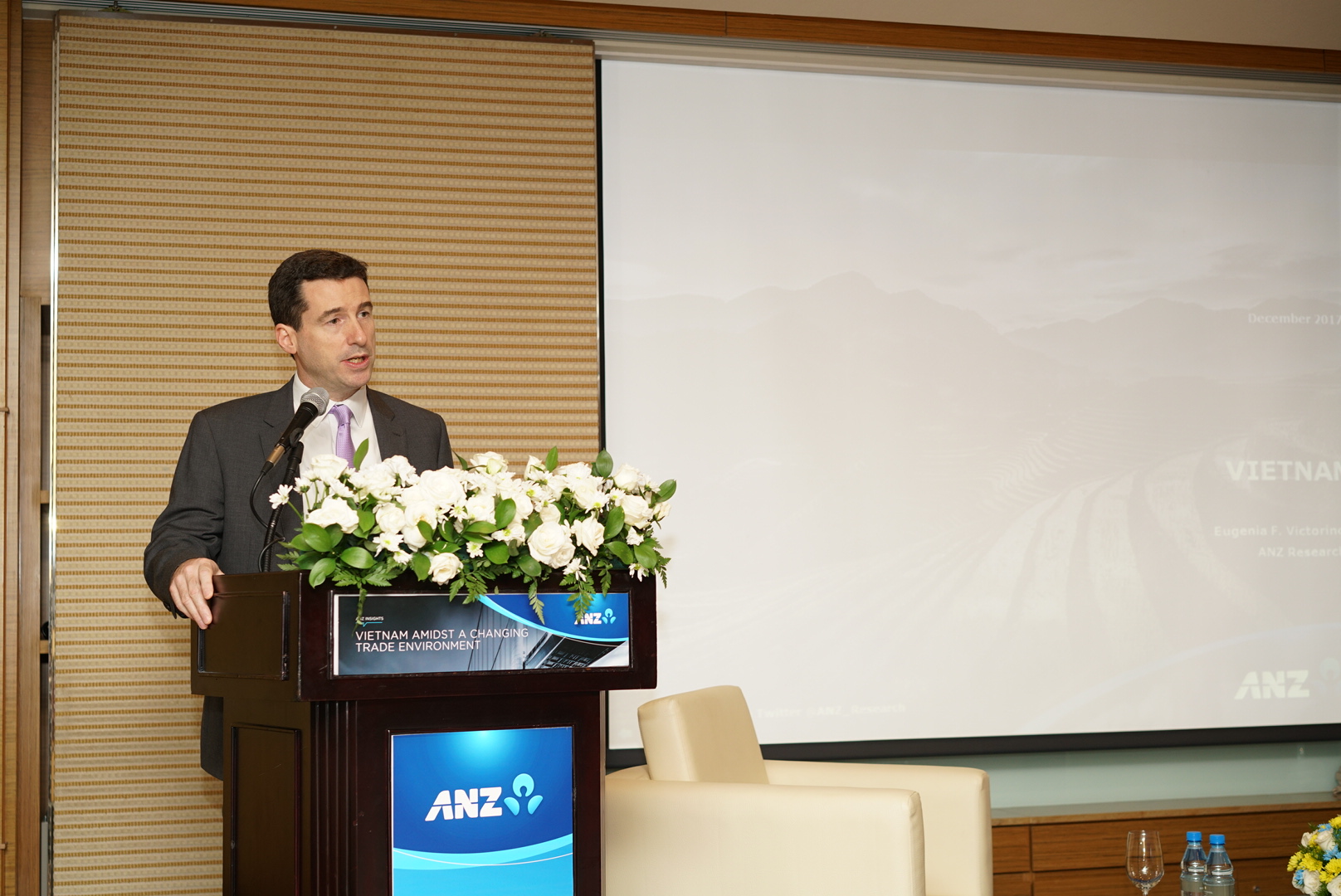ANZ upbeat about Vietnam's prospects
 |
ANZ has just released its latest report on Vietnam, which paints a rosy outlook for the economy. The bank raised its forecast for Vietnam’s GDP growth in 2017 from 6.5 to 6.7 per cent, and believed that the figure can be higher in the coming years. This climb will secure Vietnam’s position as the second fastest-growing economy in the world only behind China.
ANZ economist Eugenia Victorino attributed this growth to strong exports boosted by trade deals, good credit growth, and steady inflows of foreign capital. Inflation is likely to remain manageable at 3.5 per cent and interest rates are expected to stay at 6.25 per cent in 2018.
 |
| ANZ disclosed its findings to the public in Ho Chi Minh City |
The economist then highlighted that foreign investment into Vietnam has shifted in recent years, as 42.3 per cent of the capital is now flowing into utilities. Manufacturing, which used to attract 70 per cent of inbound capital, now accounted for only 31.7 per cent. According to ANZ, foreign investors have realised that they need to have a strong infrastructure backbone to support manufacturing activities in Vietnam, resulting in the recent surge in utilities investments.
 |
| ANZ economist Eugenia Victorino talked about the report's findings |
“Foreign manufacturers have experienced a lack of power and other infrastructure issues in Vietnam, so it is a sustainable option to invest in utilities now. This is good for Vietnam in the long term,” said Victorino.
Since January, Vietnam has attracted $16.3 billion of new FDI capital.
The ANZ economist added that Vietnam’s young workforce, most of whom have completed basic education, has traditionally been the main driver for foreign capital into manufacturing. However, if Vietnam wants to move up the global value chain, it needs a stronger workforce with a higher level of education and more sophisticated skills.
Regarding exports, ANZ data showed that Vietnam’s export composition is transforming, with a boom in electronics and phones and declining crude oil and aquaculture products. Victorino noted that Vietnamese exports may encounter short-term deficit if the country wishes to diversify its export offers.
“The US, Vietnam’s largest export market, has expressed its dislike for countries that manipulate their currencies to gain a competitive edge in export. This is a balancing act for Vietnam if it wants to weaken the VND next year,” said the economist.
When it comes to Vietnam’s chronic problem of bad debt, ANZ believes that this is a structural issue that will persist in the next few years. Contrary to popular opinions that non-performing loans should be solved as quickly as possible, the bank argued that too fast a cleanup can be disruptive to the economy.
 |
| ANZ Vietnam CEO Dennis Hussey shared his thoughts about the Vietnamese banking sector |
CEO of ANZ Vietnam Dennis Hussey added that he has seen significant progress in solving bad debts in Vietnam, especially with the recent revised Law on Credit Institutions.
“The upcoming Basel II will also force discipline in the banking sector, pushing banks to raise capital, strengthen their risk management progress, and manage bad debts,” said Hussey.
| RELATED CONTENTS: | |
| ANZ pursues dominance in transactional banking | |
| ANZ Vietnam sells its retail arm to Shinhan Vietnam | |
What the stars mean:
★ Poor ★ ★ Promising ★★★ Good ★★★★ Very good ★★★★★ Exceptional
Latest News
More News
- MAE names big 10 policy wins in 2025 (February 06, 2026 | 08:00)
- US firms deepen energy engagement with Vietnam (February 05, 2026 | 17:23)
- Vietnam records solid FDI performance in January (February 05, 2026 | 17:11)
- Site clearance work launched for Dung Quat refinery upgrade (February 04, 2026 | 18:06)
- Masan High-Tech Materials reports profit: a view from Nui Phao mine (February 04, 2026 | 16:13)
- Hermes joins Long Thanh cargo terminal development (February 04, 2026 | 15:59)
- SCG enhances production and distribution in Vietnam (February 04, 2026 | 08:00)
- UNIVACCO strengthens Asia expansion with Vietnam facility (February 03, 2026 | 08:00)
- Cai Mep Ha Port project wins approval with $1.95bn investment (February 02, 2026 | 16:17)
- Repositioning Vietnam in Asia’s manufacturing race (February 02, 2026 | 16:00)
















 Mobile Version
Mobile Version